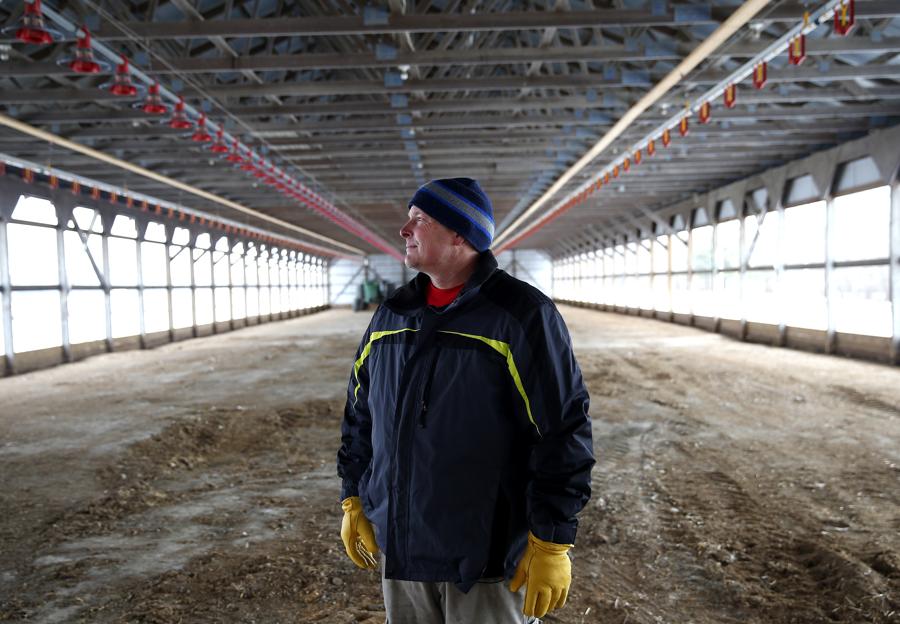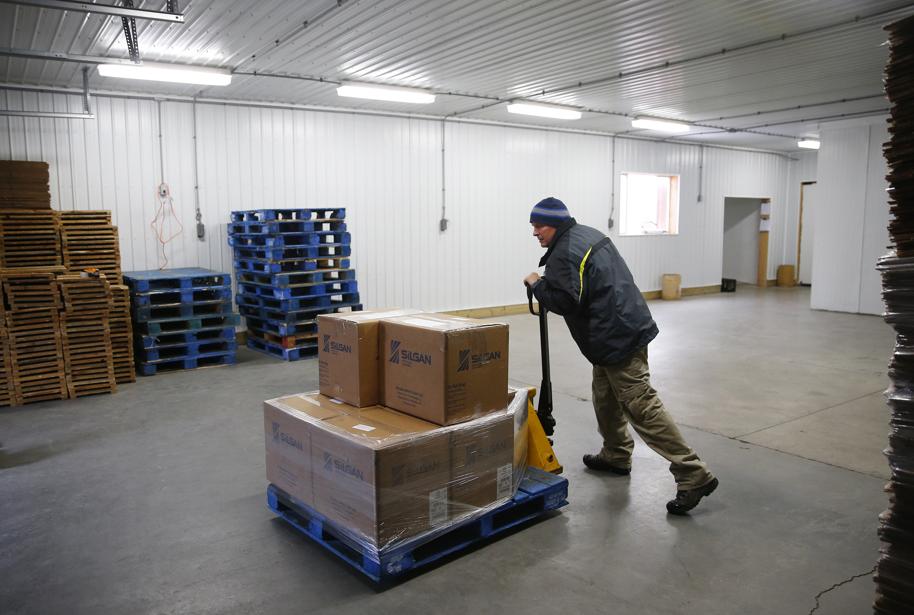

ORWELL, Vt. — In mid-October, a couple of days before Peter Stone planned to start slaughtering his turkeys for Thanksgiving, the Vermont farmer made his usual late-afternoon rounds to check his barns.
All looked well. About 33,000 turkeys gobbled atop their straw bedding inside the eight expansive buildings. But by the next morning, about 15 turkeys had died. Something must have startled them, Stone figured. When turkeys become frightened, they can trample each other in a panic.
After another 15 to 20 birds perished, however, Stone began to suspect an illness. The culprit was fowl cholera, a bacterial disease that attacks the bird’s respiratory system. The illness spread quickly from barn to barn, killing dozens of turkeys within hours and an average of 80 a day at its peak.
In all, Stonewood Farm lost half of its flock at the worst possible time — a devastating blow to a small family operation that had just celebrated its 40th anniversary, and a painful reminder of the uncertainty faced by those who make their living off the land.
“We’ve had a few good years, so it’s just disappointing that all of a sudden, we’ve had this bad of a year,’’ Stone said. “But I guess that’s just farming. It wouldn’t be farming unless it was always up and down.’’
The outbreak came at the end of the farm’s six-month cycle of raising turkeys from day-old poults to full-size birds, and stole much of its investment. The carefully balanced mix of feed alone costs about $400,000 per season, Stone said.
This year had looked like one of the best yet for Stonewood, which sits on 800 acres of rolling hills in Orwell, Vt., a town with little more than a post office and general store. The Stones had raised more turkeys — and larger ones — than ever before, and expected sales to reach a new high.
Instead, Thanksgiving sales dropped from 17,000 last year to about 9,700, cutting their revenue in half, roughly $400,000, Stone said. Some of Stonewood’s customers, mostly small stores and specialty grocers across New England, received none of the turkeys they had ordered. Others ended up just a few birds short in certain sizes, mostly the smaller and larger varieties.
A few weeks ago, Stone sent letters to let them know.
Michael Mazzeo, who co-owns Mazzeo’s Meat & Seafood inside Guido’s Fresh Marketplace in Pittsfield and Great Barrington in the Berkshires, said he first heard about Stonewood turkeys about six years ago from a food-savvy customer, who raved about their flavor. He has since placed his entire Thanksgiving order with the Vermont farm, until this year when he had to buy some smaller birds from a New York poultry provider.
“You can’t get mad at the guy; you feel for the guy,’’ said Mazzeo, who hoped to buy about 1,200 Stonewood turkeys this year. “Hopefully he survives this, and we definitely want to be on board with him in the future.’’
Fowl cholera doesn’t transmit to humans and doesn’t taint the meat, said Kristin Haas, state veterinarian for the Vermont Agency of Agriculture, Food and Markets. All of Stonewood’s birds were tested by US inspectors and certified safe to eat, Haas said.
The disease is uncommon in Vermont, which has few poultry farms. As far as she knows, it did not spread beyond the farm, she said.
Stonewood vaccinates against a few turkey diseases, including fowl cholera, but the treatment isn’t very effective, Stone said. The primary prevention method is vigilant “biosecurity’’ practices — disinfecting boots before and after entering barns, restricting outside visitors, and controlling rodent and predator access.
“This is one of a million different problems that can lead to a sick animal in a commercial flock or a herd,’’ Haas said of fowl cholera. “You can’t put a bubble around them.’’
Stone still doesn’t know how his turkeys got sick. As soon as he realized what was happening, he and his staff started the slaughter. For the Thanksgiving harvest, he adds 24 seasonal workers, many of them Jamaicans with temporary work visas, to his three regular employees.
For two weeks, they processed as fast as they could, but the fatalities mounted.
“It got to the point where we couldn’t count how many were dying,’’ Stone said.
He sent organ samples from dead birds to labs in Iowa and Georgia, both of which identified fowl cholera. Stone tried an antibiotic to slow the disease, but it didn’t work well.
Usually, Stone would keep growing some turkeys after Thanksgiving for the frozen ground turkey, turkey sausage, and boneless breasts he sells to support the farm through the winter. Without that, he expects to lose another $250,000 or more in sales. Next month, he’ll bring in about 2,000 poults to make up some of the difference, although heating the barns to keep them warm will boost the cost.
Stonewood has no insurance to cover this kind of loss. A US Department of Agriculture program provides disaster relief for livestock farmers in some situations, and Stone said he plans to apply.
His parents, Paul and Frances Stone, started the business in 1976 as a dairy farm before switching to turkeys. Peter and his wife, Siegrid Mertens, took over the operation in 2009. They live with their three children in a wood-shingled house on the property, a short walk from the barns.
On Thursday, the Stones will sit down to a turkey dinner with about 30 friends and relatives. That gives Peter Stone something to be thankful for.
“I still have my family,’’ he said. “And we’re still going.’’
Carolyn Shapiro can be reached at carshapiro@gmail.com.



